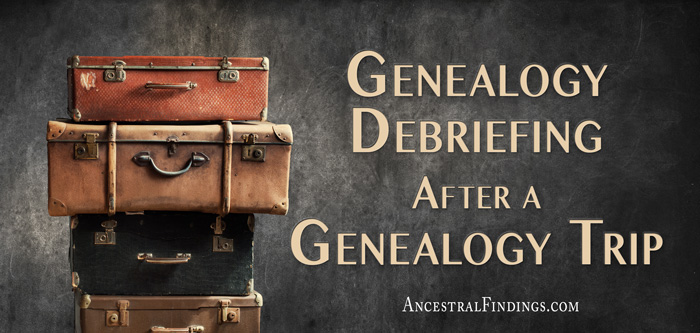Have you ever considered taking a vacation to the homeland of your ancestors? If so, you are far from alone. Genealogy tourism is more popular than ever. With more people getting involved in genealogy, the number of people who want to see for themselves the places where their ancestors lived, walked, worked, and loved is at an all-time high. And, there are genealogy tourism companies that are jumping on this trend. Why is genealogy tourism so popular right now, and how can you use it to add important and hard to find information to your family tree? Here’s what you need to know.
The popularity of genealogy tourism means that some cruise companies are now partnering with genealogy research companies to bring a full “return to the homeland” experience for those who are researching their roots and looking to walk in the literal footsteps of their ancestors. As an example, Cunard cruise lines is partnering with Ancestry.com to deliver full package genealogy tourism trips to customers looking for this experience.
Done correctly, a genealogy tourism trip can be life-changing. And, there are several different ways you can go about it. You can go to the “old country,” find your ancestor’s town or village, look in the local archives and parish registers, and maybe meet some local residents who are related to you (and who may know personal stories about your ancestor). Or, you can take it a step further, for the full genealogy tourism experience, and retrace your ancestor’s steps in either leaving the old country or arriving in the new one.
This is one of the things the Cunard trips offer. They allow passengers to take the same trip across the ocean their ancestors did. They market specifically to people who are looking to reconnect with their past in a very real and tangible way. There is nothing quite as “in depth” in the genealogy world as standing at the site of your ancestor’s homestead (or the actual homestead, if it still exists). If you can do it in another country, where a particular family line originated, it is even more profound of an experience.
Like other genealogy tourism trips that are arranged by tourism companies, and not just done on your own, the Cunard trip allows passengers access to four genealogists who work for Ancestry.com during the voyage. The genealogists conduct genealogy seminars on board the ship and help passengers with researching their family trees on an individual basis, so participants get really one on one assistance with their research from professionals. Upon arriving in the old country, different tours of historic areas, archives, and individual passengers’ ancestors’ own villages can be arranged. When returning to New York, tours of Ellis Island and other New York City landmarks can be booked, if a passenger is interested.
There are plenty of genealogy tourists who are looking for this kind of personal experience with their travels. No longer do genealogists have to do the research, arrange the trip, and book all of their destinations themselves. They do not have to wander a foreign country alone. Genealogy tourism companies are there to arrange the experience for them in a smooth, easy way that is not simple to do when one is not familiar with the area, the people, the customs, or (sometimes) the language.
There are organized genealogical tourism trips that even do DNA testing on randomly selected participants, and perform test result reveals to and from the destination, which can lead to more research avenues for the participants, and some excellent stories and ideas for other participants in their own research. Including DNA in genealogy, tourism trip is an excellent idea that further personalizes the trip, and is taking off with more tourism companies.
Whether you choose a cruise or a trip by plane and then by land, if you go with a genealogy tour group, you will more often than not learn something intriguing and important about your ancestors on the trip that you might not have learned on your own (whether you stayed home or went on the trip by yourself). Not to mention, when you go on a genealogy tourism trip with a tour group, you get excellent discounted rates on the transport and hotels. You will likely save money by doing a genealogy trip with a group, rather than on your own.
In fact, the rise of affordable DNA testing has increased the demand for genealogy tourism. In the past, many people would travel to the homeland of their ancestors, but maybe without knowing the exact town or village in which their ancestor lived. With affordable DNA testing, results can pinpoint more accurate origin points for ancestors, which allows trips to be more precise and detailed than in the past.
Genealogical societies like NEHGS and NGS have been offering general genealogy tour and research trips for a while. Now, in addition to Cunard, companies like Ancestry.com itself (apart from a cruise line) and National Geographic are organizing their own unique genealogical travel programs for tourists.
Popular travel destinations that are known to have had a large number of immigrants to other countries in the past, such as Ireland, Scotland, Germany, France, Canada, England, Spain, The Netherlands, Italy, and more, are also jumping on the genealogy tourism bandwagon. These countries, and others like them, are incorporating appeal to those whose ancestors hailed from there in their tourism promotions. These countries are opening their archives, revamping their parish registers, putting more archivists and genealogists on staff at these places, and refurbishing the genealogy sections at their local libraries. They know the big tourism dollars that can come with genealogical travelers, and they want to cater to them.
Whether you want to travel to your ancestor’s homeland out of curiosity, to “find yourself,” or to simply honor those who came before you who made you who you are, you will find a genealogy tourism experience that is right for you. And, you will be a better, more rounded, knowledgeable, and deeper person for taking it.





